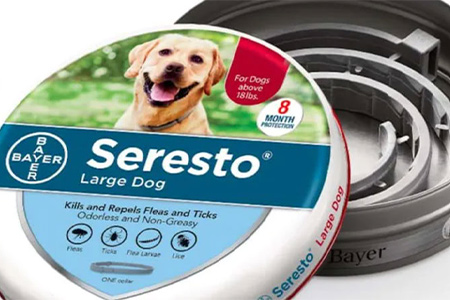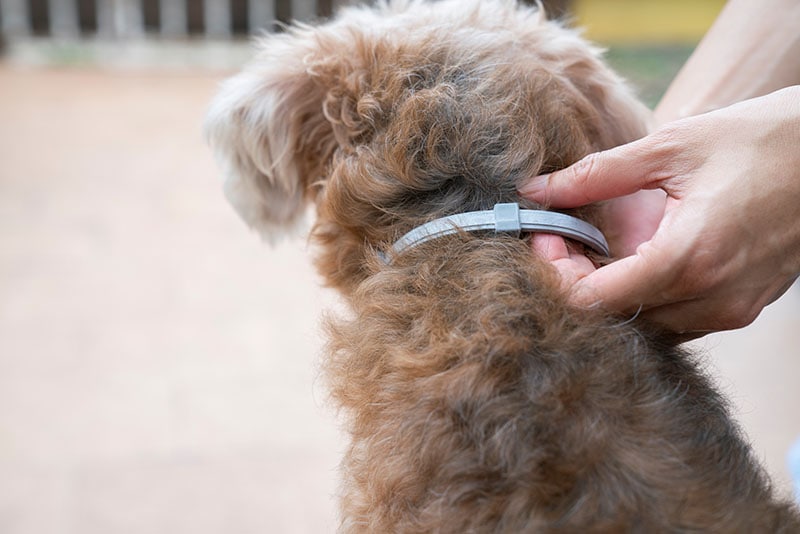As a pet owner, it is important to keep your furry friends free from fleas and ticks. These tiny pests can cause discomfort and health problems for both dogs and cats. While there are a variety of products available to combat fleas and ticks, some pet owners wonder if they can use cat flea collars on their dogs.
Cat flea collars contain a specific type of pesticide that is designed to repel or kill fleas on cats. However, using a cat flea collar on a dog can be dangerous and ineffective. In this article, we will explore why cat flea collars may not be suitable for dogs and what alternatives you can use to keep your dog flea-free.
Cat flea collars contain different ingredients and dosages that are specifically formulated for cats. Using a cat flea collar on a dog may not only be ineffective but also dangerous for the dog’s health. Dogs have a different physiology and may react negatively to the cat flea collar’s ingredients. It is always best to use flea collars that are specifically designed for dogs.

Can You Use Cat Flea Collars on Dogs?
If you’re a pet owner, you understand the importance of keeping your furry friend free from fleas and ticks. Fleas and ticks can cause a host of health problems, including skin irritation, anemia, and Lyme disease. One popular solution for getting rid of fleas and ticks on cats is the use of flea collars. But can you use cat flea collars on dogs?
Understanding Flea Collars
Flea collars are designed to repel and kill fleas and ticks. They work by releasing a pesticide that is absorbed into your pet’s skin and coat. The pesticide is then spread throughout your pet’s body, killing any fleas or ticks that come into contact with it. There are many different types of flea collars available on the market, including those designed specifically for cats and dogs.
Benefits of Flea Collars
One benefit of flea collars is that they are easy to use. You simply place the collar around your pet’s neck, and they are protected from fleas and ticks for several months. Flea collars are also affordable, making them a popular choice for pet owners on a budget.
Can You Use Cat Flea Collars on Dogs?
While flea collars designed for cats and dogs may look similar, they are not interchangeable. Cat flea collars are designed specifically for the unique physiology of cats and contain different ingredients than those designed for dogs. Using a cat flea collar on a dog can be dangerous, as the pesticide used in the collar can be toxic to dogs.
The Risks of Using Cat Flea Collars on Dogs
If you use a cat flea collar on your dog, they may experience symptoms such as vomiting, diarrhea, and seizures. In severe cases, using a cat flea collar on a dog can lead to death. It is important to always use flea collars that are designed specifically for your pet’s species.
Alternatives to Flea Collars
If you’re looking for an alternative to flea collars, there are many options available. Flea and tick medication, such as topical treatments and oral tablets, can be effective in keeping your pet free from fleas and ticks. You can also use flea combs and shampoos to remove fleas and ticks from your pet’s coat.
The Benefits of Using Dog Flea Collars
Dog flea collars are designed specifically for dogs and contain ingredients that are safe for them. They are also effective in repelling and killing fleas and ticks, keeping your pet free from these pesky parasites. Dog flea collars are easy to use and can provide protection for several months.
Dog Flea Collars vs. Other Flea and Tick Prevention Methods
While there are many different flea and tick prevention methods available, using a dog flea collar can be a convenient and effective option. Unlike topical treatments, flea collars do not need to be applied directly to your pet’s skin, and they can provide protection for longer periods of time than shampoos or sprays.
Choosing the Right Flea Collar for Your Dog
When choosing a flea collar for your dog, it is important to consider their age, weight, and overall health. Some flea collars may not be suitable for puppies or dogs with certain medical conditions. It is also important to read the instructions carefully and follow them closely to ensure your pet’s safety.
Conclusion
While cat flea collars may look similar to those designed for dogs, they are not interchangeable. Using a cat flea collar on a dog can be dangerous and can lead to serious health problems. Instead, it is important to use flea collars that are designed specifically for your pet’s species. By using the right flea collar, you can keep your furry friend free from fleas and ticks and ensure their overall health and well-being.
Frequently Asked Questions
Can You Use Cat Flea Collars on Dogs?
It is not recommended to use cat flea collars on dogs. The reason being, cat flea collars are specifically designed for the size and weight of cats, and may not be able to handle the weight of a larger dog. Additionally, the chemicals used in cat flea collars may not be safe for dogs and could cause harm.
If you are in need of flea protection for your dog, it is best to use a flea collar specifically designed for dogs. These collars are made with a different formula that is safe for dogs and are designed to fit the size and weight of a dog, ensuring maximum protection.
What Happens if a Dog Wears a Cat Flea Collar?
If a dog wears a cat flea collar, it could potentially cause harm. The chemicals used in cat flea collars are not designed for the size and weight of a dog, which could lead to toxicity. Additionally, if the collar is too small for the dog, it could become a choking hazard.
If you suspect that your dog has ingested any part of a cat flea collar or is experiencing any adverse reactions from wearing one, it is important to contact your veterinarian immediately. They will be able to provide you with guidance on the best course of action to take.
Can I Cut a Cat Flea Collar to Fit My Dog?
No, it is not recommended to cut a cat flea collar to fit your dog. Cat flea collars are designed to fit the size and weight of a cat, and cutting the collar could result in an improper fit for your dog. Additionally, the chemical formula used in the collar is specifically designed for the size and weight of a cat, and cutting the collar could result in an incorrect dosage for your dog.
If you are in need of flea protection for your dog, it is best to use a flea collar specifically designed for dogs. These collars are made with a different formula that is safe for dogs and are designed to fit the size and weight of a dog, ensuring maximum protection.
What is the Best Flea Collar for Dogs?
The best flea collar for dogs is one that is specifically designed for their size and weight. Some of the top brands for flea collars for dogs include Seresto, Bayer K9 Advantix, and Hartz UltraGuard Pro. These collars are designed to provide long-lasting protection against fleas and ticks, and are made with a formula that is safe for dogs.
When choosing a flea collar for your dog, it is important to consider their size, weight, and any sensitivities they may have to certain chemicals. It is also important to follow the instructions provided with the collar to ensure maximum effectiveness.
How Long Does a Flea Collar Last on a Dog?
The length of time a flea collar lasts on a dog will depend on the brand of collar and the size and weight of the dog. Some flea collars are designed to provide protection for up to 8 months, while others may only last for a few weeks. It is important to read the instructions provided with the collar to ensure maximum effectiveness.
Additionally, it is important to monitor your dog for any adverse reactions to the collar, and to replace the collar as necessary to ensure ongoing protection against fleas and ticks.

How Do Flea Collars Work?
As a professional writer, it is important to research and be knowledgeable about various topics. When it comes to the question of whether or not cat flea collars can be used on dogs, the answer is not a straightforward one. While some cat flea collars may be labeled as safe for use on dogs, it’s essential to read the instructions and consult with a veterinarian before using them.
It’s important to note that dogs and cats have different metabolisms and can react differently to certain chemicals. Using a cat flea collar on a dog without proper research and consultation can lead to adverse reactions such as skin irritation or even poisoning. Therefore, it’s always best to err on the side of caution and use flea treatments specifically designed for dogs. Consult with a veterinarian to determine the best flea treatment for your furry friend and ensure their safety and well-being.
